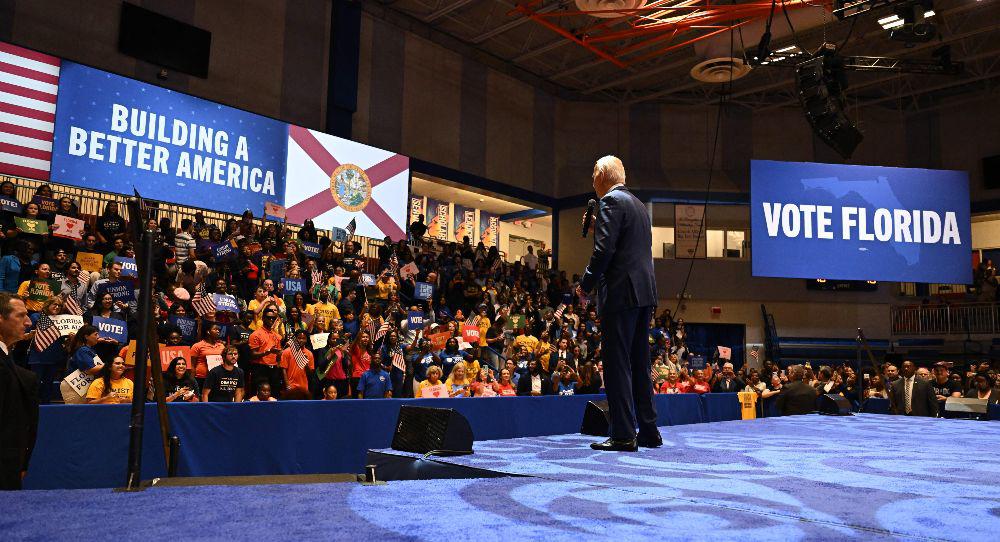It’s not as if European governments didn’t have enough time to prepare for the extraordinary changes taking place in the United States over the past several years.
When Donald Trump was U.S. president in 2017–2021, the Europeans mocked his style and support for populists, criticized his negative attitude toward NATO and scorned his relationship with Russian President Vladimir Putin.
Above all, they were shaken after Trump’s supporters, enraged by Joe Biden’s election victory, stormed Capitol Hill on January 6, 2021. To this day, as American voters go to the polls on November 8 for the midterm elections, many Republicans deny the outcome of the 2020 presidential result.
The country that Joe Biden and his Democratic Party inherited is even more dangerously polarized. As Biden repeatedly said on the campaign trail, America’s democracy is being undermined. The very foundations of stability and decency is being threatened. The once undisputed leader of the West can no longer be taken for granted.
Europeans should be worried. What is taking place on the other side of the Atlantic is not a blip that the Biden administration can correct. It is a trend that is contagious and deepening. And it coincides with the rise of authoritarianism, in China, Russia, and Turkey, but also countries in Latin America and in Africa. In the EU itself, democracy and the rule of law are being challenged in Poland and Hungary.
These developments are taking place at a time when the outcome of Russia’s war in Ukraine will have a profound impact not only on the West but on Eastern Europe as well. That impact, exacerbated by what is taking place in the United States, will be to Europe’s detriment and Russia’s gain, unless the union introduces fundamental changes to its foreign, security, and defense policy.
European security and defense not only lacks coherence—Europeans have no shared strategic outlook or shared threat perception.
One reason for these deficits is that the Europeans took for granted the security umbrella and leadership provided by the United States since World War Two. There were frequent swings between American engagement and isolationism. Trump’s tenure sharpened the divisions and railed against the Europeans for being free riders by relying on the United States’ security guarantee.
As a result of Trump’s cajoling preceded by Russia’s first invasion of Ukraine in 2014, several European countries increased defense spending. But that was not the same as taking their security seriously. So while the NATO-friendly Biden administration reassured the Europeans about Washington’s commitment to the alliance, that gave them a false sense of security as if the old comfortable transatlantic relationship was back on track.
Russia’s war against Ukraine has shown just how skewed the transatlantic relationship has become. Without Biden at the helm and the $52 billion ($52 billion) of total military, financial, and humanitarian aid Washington has committed to Ukraine, Putin might have been able to quash Ukraine’s military and destroy its morale.
Biden’s support for Ukraine is now being challenged by sections of the Republican Party. They have threatened to withhold aid or even cut financial and military assistance to Kyiv.
As for the Europeans, leaving aside the unequivocal support for Ukraine by the Baltic States, Poland, other Central European countries—and the United Kingdom—financial and military commitment to Ukraine has exposed the asymmetry of the transatlantic relationship.
As recent data from the Kiel Institute for the World Economy shows, the United States is the largest bilateral supporter of Ukraine having committed, as of October 3, 2022, €52 billion ($52 billion). All EU member states combined have committed around €13 billion ($13 billion), plus €16 billion ($16 billion) from the European institutions.
“It is remarkable that the US alone has committed considerably more than all EU countries combined, in whose immediate neighborhood the war is raging,” Christoph Trebesch, research director at the Kiel Institute, has stated.
Without the United States taking the lead over Ukraine, including on imposing sanctions, Europe’s support for its Eastern neighbor would have been far less. And if the Republicans take control of Congress and challenge Washington’s commitment to Ukraine, it is highly questionable if the Europeans will be ready to take the financial, political, and military lead in supporting Ukraine.
This is the essential weakness of the transatlantic relationship. The Europeans are unprepared to lead or even compensate to some degree for the changes taking place in the United States..
Most European leaders will not endorse President Emmanuel Macron’s idea for strategic autonomy, an ambition that ebbs more than flows. Furthermore, Europeans generally distrust each other to “do” security and defense collectively. They can, for now, continue to fall back on NATO. But this alliance is about and relies on American leadership.
Unless Europeans start sharing the burden and exercising leadership, they will be unable to plant stability and peace in Ukraine and the rest of Eastern Europe. They cannot afford to wait for the next U.S. presidential election.
This blog is part of the Transatlantic Relations in Review series. Carnegie Europe is grateful to the U.S. Mission to the EU for its support.









